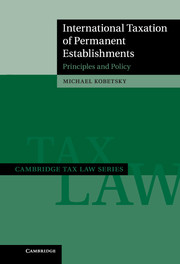Book contents
- Frontmatter
- Contents
- Abbreviations
- 1 Introduction
- 2 International taxation: policy and law
- 3 Some shortcomings of the tax treaty system
- 4 History of tax treaties and the permanent establishment concept
- 5 The role of the OECD Model Tax Treaty and Commentary
- 6 Defining the personality of permanent establishments under former Article 7 and the pre-2008 Commentary and the 2008 Commentary
- 7 Intra-bank loans under the pre-2008 Commentary and 1984 Report
- 8 Intra-bank interest under the 2008 Report
- 9 Business restructuring involving permanent establishments and the OECD transfer pricing methods
- 10 New Article 7 of the OECD Model and Commentary
- 11 Unitary taxation
- 12 Conclusion
- Bibliography
- Index
3 - Some shortcomings of the tax treaty system
Published online by Cambridge University Press: 07 September 2011
- Frontmatter
- Contents
- Abbreviations
- 1 Introduction
- 2 International taxation: policy and law
- 3 Some shortcomings of the tax treaty system
- 4 History of tax treaties and the permanent establishment concept
- 5 The role of the OECD Model Tax Treaty and Commentary
- 6 Defining the personality of permanent establishments under former Article 7 and the pre-2008 Commentary and the 2008 Commentary
- 7 Intra-bank loans under the pre-2008 Commentary and 1984 Report
- 8 Intra-bank interest under the 2008 Report
- 9 Business restructuring involving permanent establishments and the OECD transfer pricing methods
- 10 New Article 7 of the OECD Model and Commentary
- 11 Unitary taxation
- 12 Conclusion
- Bibliography
- Index
Summary
Introduction
This chapter surveys two aspects of the current taxation of cross-border transactions: international tax avoidance, and problems in the operation of bilateral tax treaties. The chapter argues that there is a need for international tax reform in response to the globalization of international trade. The chapter focuses first on international tax avoidance, and outlines the ability of international enterprises to avoid taxation through sophisticated tax planning techniques. A major form of international tax avoidance by international enterprises is transfer pricing manipulation by associated enterprises. Transfer pricing anti-avoidance measures, in tax treaties and domestic legislation, are based on the arm's length principle. The chapter considers transfer pricing manipulation and examines the difficulties of applying the arm's length principle to transactions between associated enterprises. While the appeal of the arm's length principle is that it is theoretically straightforward, it has proven very difficult to apply in practice.
The chapter considers some of the problems created by the current international tax measures. The main flaw with these measures is that they do not provide a framework for the coordinated and measured implementation of tax policies and practices developed through the multilateral negotiations of countries. The current international tax treaty system is focused on removing obstacles to international trade and investment by, inter alia, allocating taxing rights between two countries. As the network of tax treaties has expanded, it has proved to be unwieldy and exceptionally difficult to reform. Meanwhile, international enterprises operate integrated global businesses and are able to exploit the current tax treaty system to avoid taxation. The chapter concludes with a brief consideration of the obstacles to international tax reform.
- Type
- Chapter
- Information
- International Taxation of Permanent EstablishmentsPrinciples and Policy, pp. 65 - 105Publisher: Cambridge University PressPrint publication year: 2011



